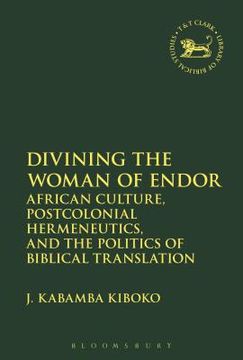Compartir
Divining the Woman of Endor: African Culture, Postcolonial Hermeneutics, and the Politics of Biblical Translation (en Inglés)
J. Kabamba Kiboko
(Autor)
·
Bloomsbury Publishing PLC
· Tapa Blanda
Divining the Woman of Endor: African Culture, Postcolonial Hermeneutics, and the Politics of Biblical Translation (en Inglés) - Kiboko, J. Kabamba
$ 101.00
$ 140.28
Ahorras: $ 39.28
Elige la lista en la que quieres agregar tu producto o crea una nueva lista
✓ Producto agregado correctamente a la lista de deseos.
Ir a Mis Listas
Origen: Estados Unidos
(Costos de importación incluídos en el precio)
Se enviará desde nuestra bodega entre el
Viernes 19 de Julio y el
Viernes 26 de Julio.
Lo recibirás en cualquier lugar de Internacional entre 1 y 3 días hábiles luego del envío.
Reseña del libro "Divining the Woman of Endor: African Culture, Postcolonial Hermeneutics, and the Politics of Biblical Translation (en Inglés)"
An examination of the language of divination in the Hebrew Bible, particularly in 1 Samuel 28:3-25-the oft-called "Witch of Endor+? passage. Kiboko contends that much of the vocabulary of divination in this passage and beyond has been mistranslated in authorized English and other translations used in Africa and in scholarly writings. Kiboko argues that the woman of Endor is not a witch. The woman of Endor is, rather, a diviner, much like other ancient Near Eastern and modern African diviners. She resists an inner-biblical conquest theology and a monologic authoritarian view of divination to assist King Saul by various means, including invoking the spirit of a departed person, Samuel. Kiboko carries out a Hebrew word-study shaped by the theories of Mikhail M. Bakhtin regarding the utterance, heteroglossia, and dialogism in order to understand the designative, connotative, emotive, and associative meanings of the many divinatory terms in the Hebrew Bible. She then examines 1 Samuel 28 and a number of prior translations thereof, using the ideological framework of African-feminist-postcolonial biblical interpreters and translation theories to uncover the hidden ideology or transcript of these translations. Finally, using African contextual/cultural hermeneutics and cross-cultural translation theory, Kiboko offers new English, French, and Kisanga translations of this passage that are both faithful to the original text and more appropriate to an inculturated-liberation African Christian hermeneutic, theology, and praxis.

